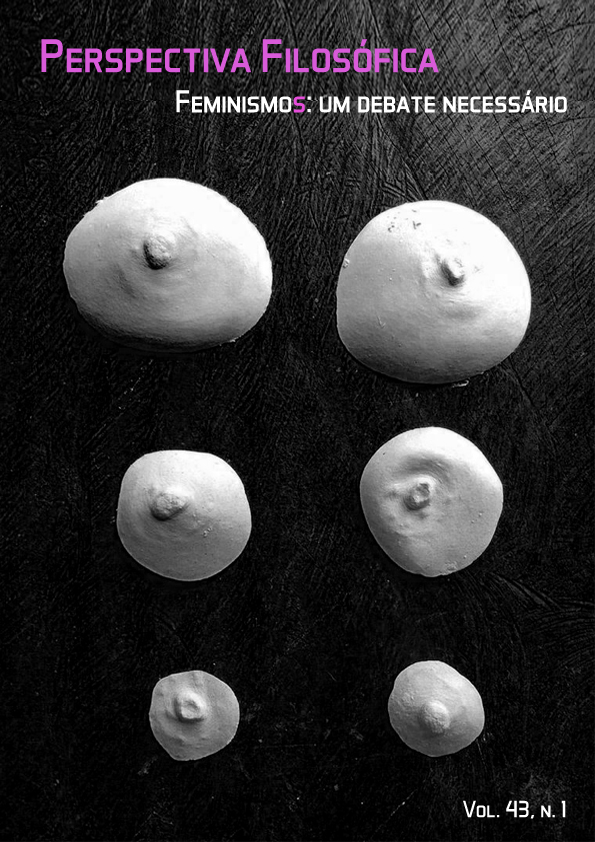Reflexões feministas sobre igualdade como uniformização e igualdade relacional
Keywords:
gender, equality-difference dilemma, social differences, justice and careAbstract
Many of the contemporary feminist theories deal with classical problems of modern political theories. Equality is undoubtedly one of these problems. This paper addresses some of the elements present in feminist theoretical discussions on equality in the light of the equality-difference dilemma, considered as an unsolvable dilemma for women (and other social categories). Equality as uniformity (linked to descriptive, normative and speculative aspects of political theories) is at the center of this dilemma. It is related to a universalism that excludes and denies differences, contributing to a conception where the identities of the individuals are conceived as substances or essences (something adequate to the private world) rather than processes or relationships (experienced both in the public and in the private). The proposal is therefore the creation of a model of relational equality that takes into account the study of the differences and the production of inequalities. In this direction, the gender system is (1) identified as an effective producer and maintainer of various social inequalities, (2) responsible for the equality-difference dilemma and (3) active in making innocuous or insufficient the affirmative policies seeking to implement equality. The implementation of relational equality requires thus to face this system in their various dimensions (symbolic, identitary, in care activities and social institutions including the family).References
AGRAWAL, Anuja. Gendered Bodies: The Case of the 'Third Gender' in India. Contributions to Indian Sociology, New Series, vol. 31, nº 2, 1997, p. 273–297.
BEAUVOIR, Simone de. O Segundo Sexo (1949). Rio de Janeiro: Nova Fronteira, volume único, 2009.
BRYSON, Valerie. Feminist Political Theory. An Introduction. Nova Iorque: Palgrave Macmillan, 2a ed. 2003.
EISENSTEIN, Zillah R. The female body and the law. Los Angeles/London: University of Califórnia Press, 1988.
FLAX, Jane. Thinking Fragments: Psychoanalysis, Feminism, and Postmodernism in the Contemporary West. Berkeley: University of California Press, 1990.
FINEMAN, Martha Albertson. The Illusion of Equality. The Rhetoric and Reality of Divorce Reform. Chicaco/Londres: The Chicago University Press, 1991.
FINEMAN, Martha Albertson. The Vulnerable Subject: Anchoring Equality in the Human Condition. Yale Journal of Law & Feminism, vol. 20, nº1, 2008, p. 1-23.
GILMAN, Charlotte Perkins. Our Androcentric Culture, or The Man-Made World, 1911. Disponível em: Acesso: janeiro de 2014.
GILLEY, Brian Joseph. Becoming Two-Spirit: Gay Identity and Social Acceptance in Indian Country, Lincoln: University of Nebraska Press, 2006.
GILLIGAN, Carol. Uma voz diferente. Psicologia da diferença entre homens e mulheres da infância à fase adulta. Rio de Janeiro: Rosa dos Tempos, 1982.
GUBIN, Éliane et coll. (dir.), Le siècle des féminismes, Paris, L’Atelier, 2004.
GROSS, Elizabeth. “Derrida, Irigaray, and Deconstruction”, Left-Wright, Intervention, Sydney, vol. 20, 1986a.
GROSS, Elizabeth. “What is Feminist Theory?” In: PATEMAN, C. e GROSS, E. (org.). Feminist Challenges, Social and Political Theory. Boston: Northeasten University Press, 1986b.
KYMLICKA, Will. Filosofia Política Contemporânea. São Paulo: Martins Fontes, 2006.
LINDEMANN, Hilde. An Invitation to Feminist Ethics. New York: McGraw Hill, 2006.
MACKINNON, Catharine. Feminism unmodified: discourses on life and law. Cambridge, Massachusetts: Harward University Press, 1987.
MINOW, Martha. Making all the difference: Inclusion, exclusion and American law. Nova Iorque e London: Cornell University Press, 1990.
NANDA, Serena. Neither Man Nor Woman: The Hijras of India, Wadsworth Publishing, 1998. Disponível em: . Acesso: maio de 2011.
OKIN, Susan Moller. Justice, gender, and the family. New York: Basic Books, 1989.
PATEMAN, Carole. O contrato Sexual (1988). Tradução de Marta Avancini. São Paulo: Paz e Terra, 1993.
PHILLIPS, Anne. De uma política de idéias a uma política de presença? Revista Estudos Feministas, Florianópolis, vol. 9, nº 1, p. 268-290, 2001. 6). Disponível em: . Acesso: 12 de abril de 2015.
ROSCOE, Will. The Zuni Man-Woman, Albuquerque: University of New Mexico Press, 1991.
RUBIN, Gayle. The Traffic in Women: Notes on the 'Political Economy' of Sex. In: REITER, Rayna R. (ed.). Toward an anthropology of women, New York: Monthly Review Press, 1975.
SCOTT, Joan Wallach. “Deconstructing Equality-Versus-Difference: Or, the Uses of Post-structuralist Theory for Feminism”, Feminist Studies, vol. 14, n. 1, 1988.
SEVENHUIJSEN, Selma. Citizenship and The Ethics of Care. Feminist Considerations on Justice, Morality and Politics. New York: Routledge, 1998.
SPADE, Joan Z. e VALENTINE, Catherine G. The kaleidoscope of gender: prisms, patterns, and possibilities. Pine Forge Press, 2008.
THORTON, Merle. “Sex Equality is Not Enough for Feminism”, In: PATEMAN, Carole e GROSZ, Elizabeth (org.), Feminist Challenges: Social and Political Theory, Boston/Sydney: Northeastern University Press/Allen & Unwin, 1986. p. 77- 98.
TONG, Rosemarie. Feminist Thought: A More Comprehensive Introduction. Westview Press, 2009.
YOUNG, Iris Marion. Justice and the Politics of Difference. Princeton: Princeton University Press, 1990.
ZERILLI, Linda. Feminist Critiques of Liberalism. In: WALL, Steve (ed.) The Cambridge Companion to Liberalism. Cambridge University Press, 2015. Disponível em: . Acesso: 06 de abril de 2015.
ZIRBEL, Ilze. O Lugar da Mulher na Antropologia Pragmática de Kant. Kant e-Prints. Campinas, Série 2, vol. 6, nº 1, p. 50 - 68, jan.- jun., 2011.
ZITA, Jacquelyn N. (ed.), “Special Issue: Third Wave Feminisms”, Hypatia, Vol. 12, No. 3, Indiana University Press, Summer, 1997.
Downloads
Published
Issue
Section
License
A Revista Perspectiva Filosófica orienta seus procedimentos de gestão de artigos conforme as diretrizes básicas formuladas pelo Conselho Nacional de Desenvolvimento Científico e Tecnológico (CNPq). http://www.cnpq.br/web/guest/diretrizesAutores que publicam nesta revista concordam com os seguintes termos:
Os autores mantém os direitos autorais e concedem à revista o direito de primeira publicação, sendo o trabalho simultaneamente licenciado sob https://creativecommons.org/licenses/by/4.0/deed.pt_BR que permite o compartilhamento do trabalho com reconhecimento da autoria e publicação inicial nesta revista.
Os autores têm autorização para assumir contratos adicionais separadamente, para distribuição não-exclusiva da versão do trabalho publicada nesta revista, com reconhecimento de autoria e publicação inicial nesta revista (Consultar http://opcit.eprints.org/oacitation-biblio.html).

Esta revista está licenciada com uma Licença Creative Commons Atribuição 4.0 Internacional.













